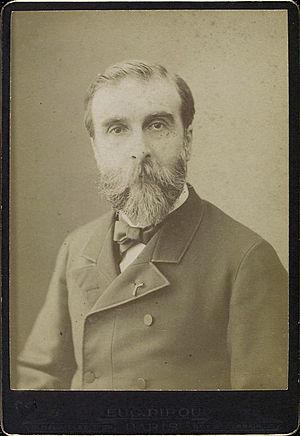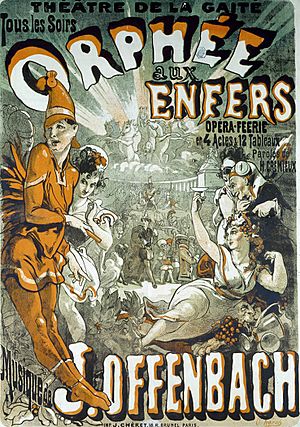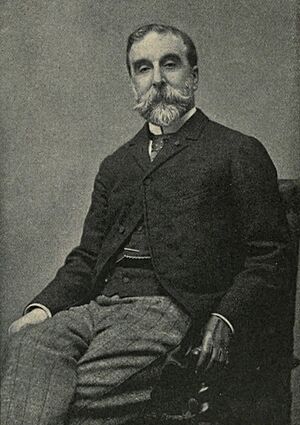Ludovic Halévy facts for kids
Quick facts for kids
Ludovic Halévy
|
|
|---|---|

Ludovic Halévy early in his career
|
|
| Born | 1 January 1837 Paris, France
|
| Died | 7 May 1908 (aged 74) Paris, France
|
| Occupation | Author |
| Parent(s) |
|
Ludovic Halévy (born January 1, 1834 – died May 7, 1908) was a French writer and playwright. He is most famous for working with Henri Meilhac on the opera Carmen by Georges Bizet. He also wrote many works with the composer Jacques Offenbach.
Contents
About Ludovic Halévy's Life
Ludovic Halévy was born in Paris, France. His father, Léon Halévy, worked for the government and was a talented writer. He tried many types of writing, like poetry, plays, and history. Ludovic's uncle, Fromental Halévy, was a famous opera composer. This meant Ludovic was connected to the theater world from a young age.
When he was six, Ludovic played in the Foyer de la danse, a place he would later write about. At twelve, he often visited the Odéon theater, where he could watch plays for free.
At eighteen, he started working for the French government. One of his jobs was as a secretary for the Corps Législatif, which was a part of the government. He was well-liked by the famous Duke of Morny, who was in charge of this group.
Becoming a Full-Time Writer
By 1865, Ludovic Halévy was becoming very popular as a writer. This allowed him to leave his government job. Ten years earlier, he had met the musician Jacques Offenbach. Offenbach was opening a small theater, and Halévy wrote a short piece for the opening night.
He wrote other small shows, like Ba-ta-clan, using the pen name Jules Servières. His real name, Ludovic Halévy, first appeared on a show's program on January 1, 1856. Soon after, his musical comedy Orphée aux enfers (written with Hector Crémieux) became a huge hit and made him famous.
Working with Henri Meilhac
In 1860, Halévy was asked to write a play for a theater manager. He was supposed to work with another writer, Lambert-Thiboust, but Lambert-Thiboust quit. Halévy then met Henri Meilhac (1831–1897) and asked him to work on the play. Meilhac agreed right away.
This was the start of a partnership that lasted over twenty years. They wrote many successful works for Parisian theaters. Their joint works can be put into three groups: operettas, farces, and comedies.
- Operettas: These were musical comedies that often made fun of society at the time. Some of their most famous operettas include La belle Hélène (1864), Barbe-bleue (1866), La Grande-Duchesse de Gérolstein (1867), and La Périchole (1868). Their play Le Réveillon also inspired Johann Strauss II's famous operetta Die Fledermaus.
After 1870, musical parodies became less popular. Halévy and Meilhac then wrote more traditional farces. These plays had complicated plots and cleverly showed the funny habits and social quirks of the time.
They also wrote the story (called a libretto) for the famous opera Carmen. This was a smaller project compared to their other works at the time.
Later Works and Recognition
Halévy and Meilhac were best at creating light stories about Parisian life, like Les Sonnettes and Le Roi Candaule. People often wondered who was the main writer in their partnership. After they stopped working together, it became clear they both had many talents. They both had wit, humor, and a good eye for observing people. Meilhac had a strong imagination, while Halévy had good taste and a more human touch.
Halévy showed his unique qualities in two wonderful books, Monsieur et Madame Cardinal (1873) and Les Petites Cardinal. These books described the everyday lives of ordinary people in Paris. He also wrote Criquette (1883) and The Abbot Constantine (1882). The novel The Abbot Constantine was very popular because it featured kind and good characters, which was different from other books at the time.
Because of his success, Ludovic Halévy was elected to the Académie française in 1884. This is a very important group that protects the French language.
Halévy continued to be involved with the Academy and other cultural groups. He passed away in Paris on May 7, 1908. He had not written much new material in his later years. His last novel, Kari Kari, was published in 1892. His personal diary was published in book form in 1935.
Films Based on His Works
Many films have been made based on Ludovic Halévy's plays and novels:
- Films based on Die Fledermaus (The operetta Die Fledermaus is based on the play Le Reveillon)
- Frou-Frou, directed by Eugene Moore (1914, based on the play Frou-Frou)
- Bettina Loved a Soldier, directed by Rupert Julian (1916, based on the novel The Abbot Constantine)
- A Hungry Heart, directed by Émile Chautard (1917, based on the play Frou-Frou)
- Frou-Frou, directed by Alfredo De Antoni (Italy, 1918, based on the play Frou-Frou)
- Fanny Lear, directed by Robert Boudrioz and Jean Manoussi (France, 1919, based on the play Fanny Lear)
- Frou-Frou, directed by Otto Rippert (Germany, 1922, based on the play Frou-Frou)
- Frou-Frou, directed by Guy du Fresnay (France, 1924, based on the play Frou-Frou)
- The Abbot Constantine, directed by Julien Duvivier (France, 1925, based on the novel The Abbot Constantine)
- So This Is Paris, directed by Ernst Lubitsch (1926, based on the play Le Reveillon)
- The Abbot Constantine, directed by Jean-Paul Paulin (France, 1933, based on the novel The Abbot Constantine)
- La Vie parisienne, directed by Robert Siodmak (France, 1936, based on the operetta La Vie parisienne)
- Parisian Life, directed by Robert Siodmak (English version, 1936, based on the operetta La Vie parisienne)
- The Toy Wife, directed by Richard Thorpe (1938, based on the play Frou-Frou)
- Tricoche and Cacolet, directed by Pierre Colombier (France, 1938, based on the play Tricoche et Cacolet)
- La Goualeuse, directed by Fernand Rivers (France, 1938, based on the play La Goualeuse)
- Les Petites Cardinal, directed by Gilles Grangier (France, 1951, based on the novel Les Petites Cardinal)
- Sköna Helena, directed by Gustaf Edgren (Sweden, 1951, based on the operetta La belle Hélène)
- Die schöne Helena, directed by Axel von Ambesser (West Germany, 1975, TV film, based on the operetta La belle Hélène)
- Parisian Life, directed by Christian-Jaque (France, 1977, based on the operetta La Vie parisienne)
See also
 In Spanish: Ludovic Halévy para niños
In Spanish: Ludovic Halévy para niños



